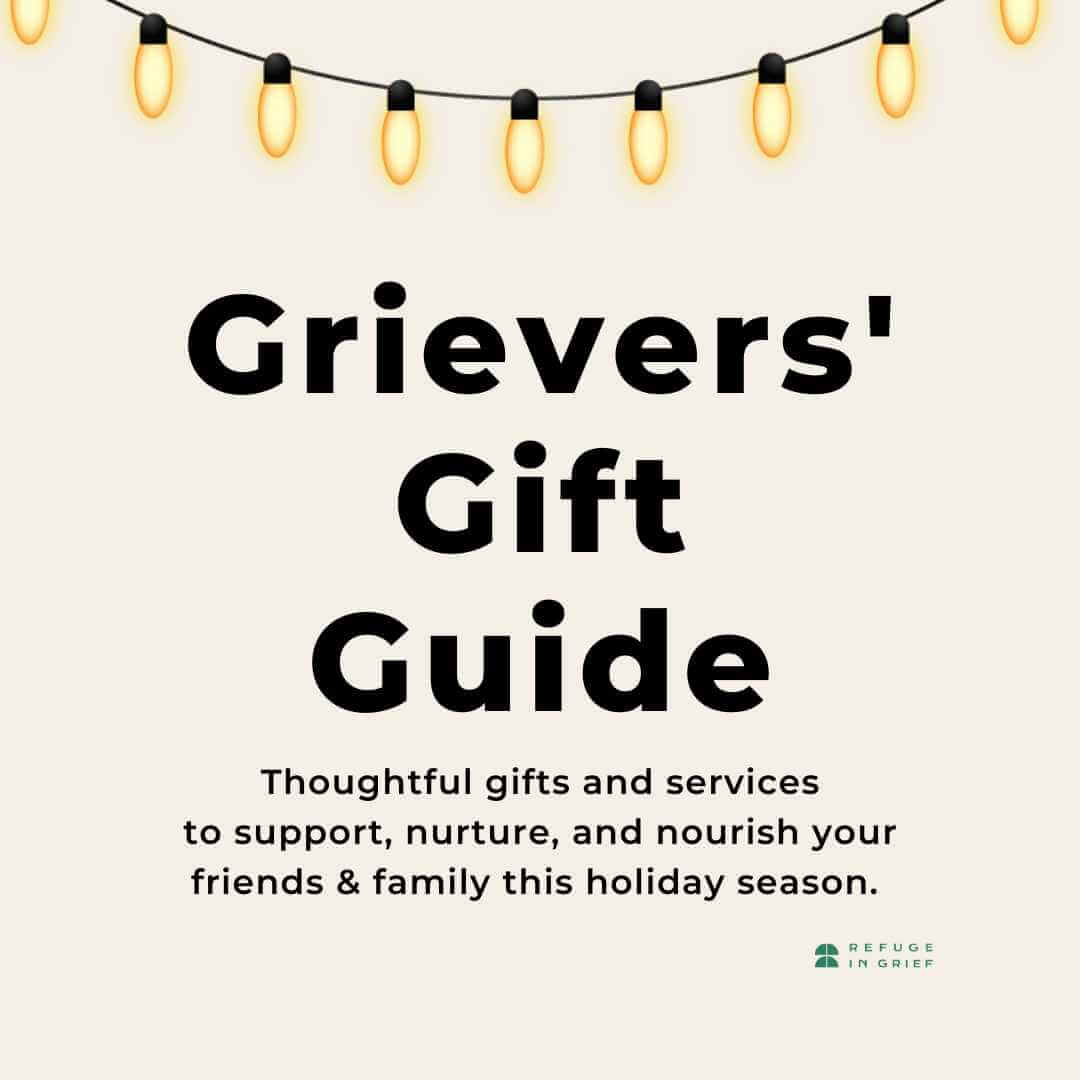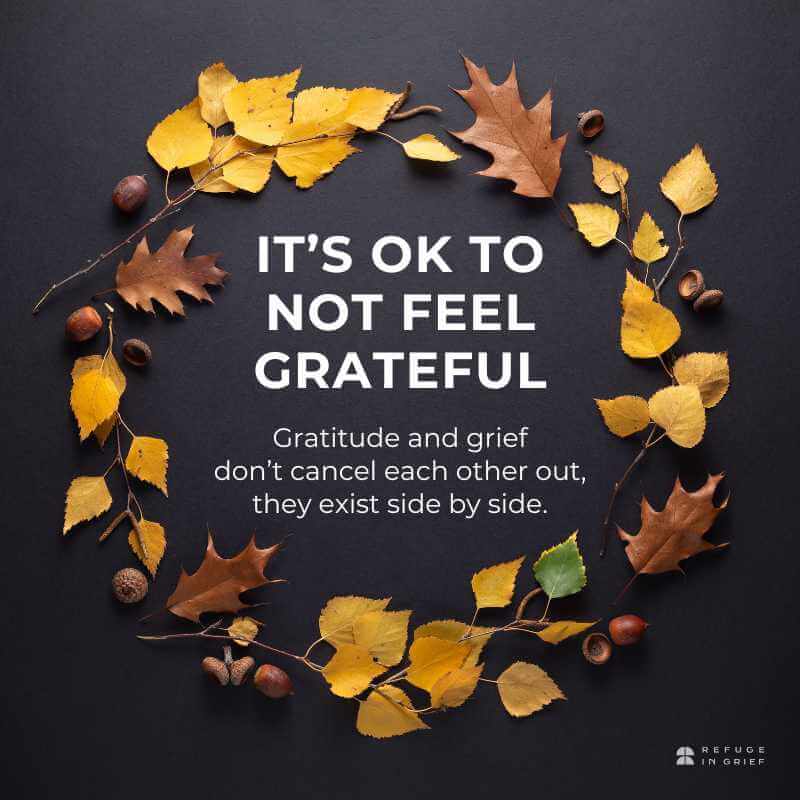How do you help a grieving friend when you live far away? 10 tips to help you provide long-distance grief support.
How do you help a grieving friend when you don’t live nearby? This is one of the most common questions we hear from friends & relatives of grieving folks. Even if you live far away, you can still be there for someone who’s in pain.
Whether you know someone dealing with loss or want to be ready when someone you love suddenly needs your support – here are some good ground rules & tips.
If you’re grieving and would like some help educating friends & family on the best ways to support you, these guidelines are for you too.
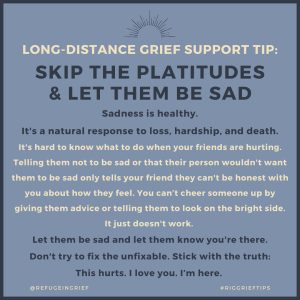 Skip the platitudes and let them be sad. Sadness is healthy. It’s a natural response to loss, hardship, and death. It’s hard to know what to do when your friends are hurting. Telling them not to be sad or that their person wouldn’t want them to be sad only tells your friend that they can’t be honest with you about how they feel. You can’y cheer someone up by giving them advice or telling them to look on the bright side. It just doesn’t work.
Skip the platitudes and let them be sad. Sadness is healthy. It’s a natural response to loss, hardship, and death. It’s hard to know what to do when your friends are hurting. Telling them not to be sad or that their person wouldn’t want them to be sad only tells your friend that they can’t be honest with you about how they feel. You can’y cheer someone up by giving them advice or telling them to look on the bright side. It just doesn’t work.
Let them be sad and let them know you’re there. Don’t try to fix the unfixable. Stick with the truth: This hurts. I love you. I’m here.
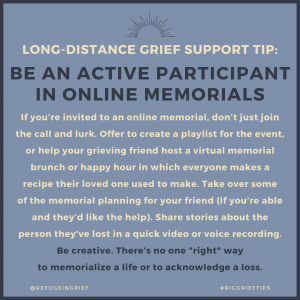 Be and active participant in online memorials. If you’re invited to an online memorial, don’t just join the call and lurk. Offer to create a playlist for the event, or help your grieving friend host a virtual memorial brunch or happy hour in which everyone makes a recipe their loved one used to make. Take over some of the memorial planning for your friend (if you’re able and they’d like the help). Share stories about the person they’ve lost in a quick video or voice recording.
Be and active participant in online memorials. If you’re invited to an online memorial, don’t just join the call and lurk. Offer to create a playlist for the event, or help your grieving friend host a virtual memorial brunch or happy hour in which everyone makes a recipe their loved one used to make. Take over some of the memorial planning for your friend (if you’re able and they’d like the help). Share stories about the person they’ve lost in a quick video or voice recording.
Be creative. There’s no one right way to memorialize a life or to acknowledge a loss.
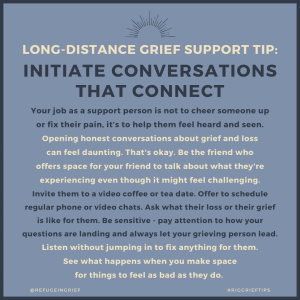 Initiate conversations that connect. Your job as a support person is not to cheer someone up or fix their pain, it’s to help them feel heard and seen. Opening honest conversations about grief and loss can feel daunting. That’s OK. Be the friend who offers space for your friend to talk about what they’re experiencing, even though it might feel challenging. Invite them to a video coffee or tea date. Offer to schedule regular phone or video chats. Ask what their loss or their grief is life for them. Be sensitive, pay attention to how your questions are landing and always let your grieving person lead.
Initiate conversations that connect. Your job as a support person is not to cheer someone up or fix their pain, it’s to help them feel heard and seen. Opening honest conversations about grief and loss can feel daunting. That’s OK. Be the friend who offers space for your friend to talk about what they’re experiencing, even though it might feel challenging. Invite them to a video coffee or tea date. Offer to schedule regular phone or video chats. Ask what their loss or their grief is life for them. Be sensitive, pay attention to how your questions are landing and always let your grieving person lead.
Listen without jumping in to fix anything for them. See what happens when you make space for things to feel as bad as they do.
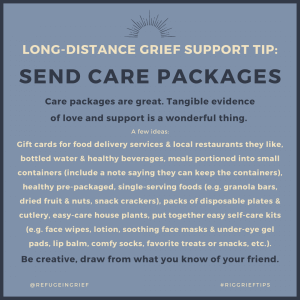 Send care packages. Tangible evidence of love and support is a wonderful thing.
Send care packages. Tangible evidence of love and support is a wonderful thing.
A few ideas: Gift cards for food delivery services and local restaurants they like, bottled water and other healthy beverages, an assortment of teas (or something else you know they enjoy), healthy pre-packaged, single-serving foods (e.g. granola bars, dried fruit & nuts, snack crackers), low-maintenance house plants, assemble an easy self-care kit (e.g. face wipes, soothing masks & under-eye gel pads, lotion, lip balm, comfy socks, favorite treats/snacks, etc.). Be creative. Draw from what you know of your friend.
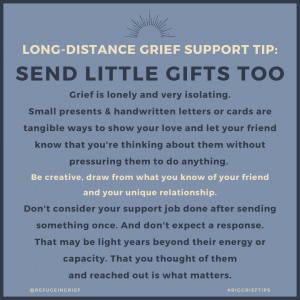 Send little gifts too. Grief is lonely and very isolating. Small presents and handwritten letters or cards are tangible ways to show your love and let your friend know that you’re thinking about them without pressuring them to do anything. Be creative. Draw from what you know of your friend and your unique relationship.
Send little gifts too. Grief is lonely and very isolating. Small presents and handwritten letters or cards are tangible ways to show your love and let your friend know that you’re thinking about them without pressuring them to do anything. Be creative. Draw from what you know of your friend and your unique relationship.
Don’t consider your support job done after sending something once. Don’t expect a response – that may be light years beyond their energy or capacity. That you thought of them and reached out is what matters.
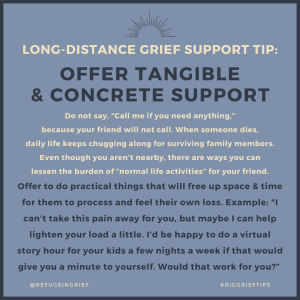 Offer tangible and concrete support. Do not say “Call me if you need anything,” because your friend will not call. When someone dies, daily life keeps chugging along for surviving family members. Even though you aren’t nearby, there are ways you can lessen the burden of “normal life activities” for your friend. Offer to do practical things that will free up space & time for them to process and feel their own loss. Example: “I can’t take this pain away for you, but maybe I can help lighten your load a little. I’d be happy to do a virtual story hour for your kids a few nights a week if that would give you a minute to yourself. Would that work for you?”
Offer tangible and concrete support. Do not say “Call me if you need anything,” because your friend will not call. When someone dies, daily life keeps chugging along for surviving family members. Even though you aren’t nearby, there are ways you can lessen the burden of “normal life activities” for your friend. Offer to do practical things that will free up space & time for them to process and feel their own loss. Example: “I can’t take this pain away for you, but maybe I can help lighten your load a little. I’d be happy to do a virtual story hour for your kids a few nights a week if that would give you a minute to yourself. Would that work for you?”
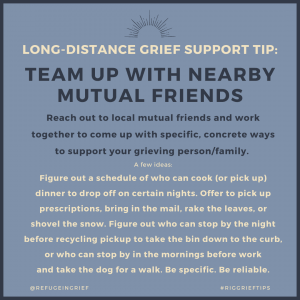 Team up with nearby mutual friend. Reach out to local mutual friends and work together to come up with specific, concrete ways to support your grieving person/family. A few ideas: Figure out a schedule of who can cook (or pick up) dinner to drop off on certain nights. Offer to pick up prescriptions, bring in the mail, rake the leaves, or shovel the snow. Figure out who can stop by the night before recycling pickup to take the bin down to the curb, or who can stop by in the mornings before work and take the dog for a walk. Be specific. Be reliable.
Team up with nearby mutual friend. Reach out to local mutual friends and work together to come up with specific, concrete ways to support your grieving person/family. A few ideas: Figure out a schedule of who can cook (or pick up) dinner to drop off on certain nights. Offer to pick up prescriptions, bring in the mail, rake the leaves, or shovel the snow. Figure out who can stop by the night before recycling pickup to take the bin down to the curb, or who can stop by in the mornings before work and take the dog for a walk. Be specific. Be reliable.
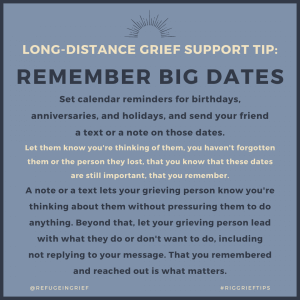 Remember big dates. Set calendar reminders for birthdays, anniversaries, & holidays, and send your friend a text or a note on those dates. Let them know you’re thinking of them, you haven’t forgotten them or the person they lost, that you know that these dates are still important, that you remember. A note or a text lets your grieving person know you’re thinking about them without pressuring them to do anything.
Remember big dates. Set calendar reminders for birthdays, anniversaries, & holidays, and send your friend a text or a note on those dates. Let them know you’re thinking of them, you haven’t forgotten them or the person they lost, that you know that these dates are still important, that you remember. A note or a text lets your grieving person know you’re thinking about them without pressuring them to do anything.
Beyond that, let your grieving person lead with what they do or don’t want to do, including not replying to your message. That you remembered and reached out is what matters.
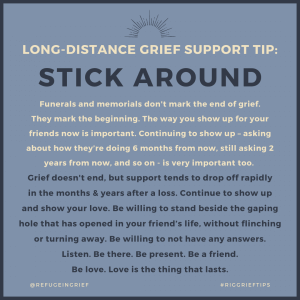 Stick around. Funerals and memorials don’t mark the end of grief. They mark the beginning. The way you show up for your friends now is important. Continuing to show up – asking about how they’re doing 6 months from now, still asking 2 years from now, and so on – is very important too. Grief doesn’t end, but support tends to drop off rapidly in the months & years after a loss. Set calendar reminders to reach out on important dates. Check in and offer a listening ear on any average, ordinary weekday or weekend. Send care packages, letters, and little gifts. These are all powerful forms of love and connection.
Stick around. Funerals and memorials don’t mark the end of grief. They mark the beginning. The way you show up for your friends now is important. Continuing to show up – asking about how they’re doing 6 months from now, still asking 2 years from now, and so on – is very important too. Grief doesn’t end, but support tends to drop off rapidly in the months & years after a loss. Set calendar reminders to reach out on important dates. Check in and offer a listening ear on any average, ordinary weekday or weekend. Send care packages, letters, and little gifts. These are all powerful forms of love and connection.
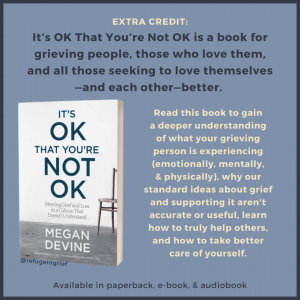 Extra credit: For a deeper understanding of grief and to learn how to truly support people in pain (and take better care of yourself), read my book, It’s OK That You’re Not OK – available wherever you buy books. Read this book to gain a deeper understanding of what your grieving person is experiencing (emotionally, mentally, and physically), why our standard ideas about grief and supporting it aren’t accurate or useful, learn how to truly help others, and how to take better care of yourself.
Extra credit: For a deeper understanding of grief and to learn how to truly support people in pain (and take better care of yourself), read my book, It’s OK That You’re Not OK – available wherever you buy books. Read this book to gain a deeper understanding of what your grieving person is experiencing (emotionally, mentally, and physically), why our standard ideas about grief and supporting it aren’t accurate or useful, learn how to truly help others, and how to take better care of yourself.
Remember: It’s OK to be feel awkward. You don’t need to be perfect, just present.
Be sure to share this post, friends. Helping people get better at giving support requires a community effort. Most people want to help, they just aren’t sure how. By sharing this post (and others from the RIG archives), we help everyone get better at delivering the love and support they intend.
It's hard to see people you love in pain. How do you support someone when you don't live near them? These tips are for you. Need some help educating friends & family on the best ways to support you long-distance? We've got you. Click To Tweet
